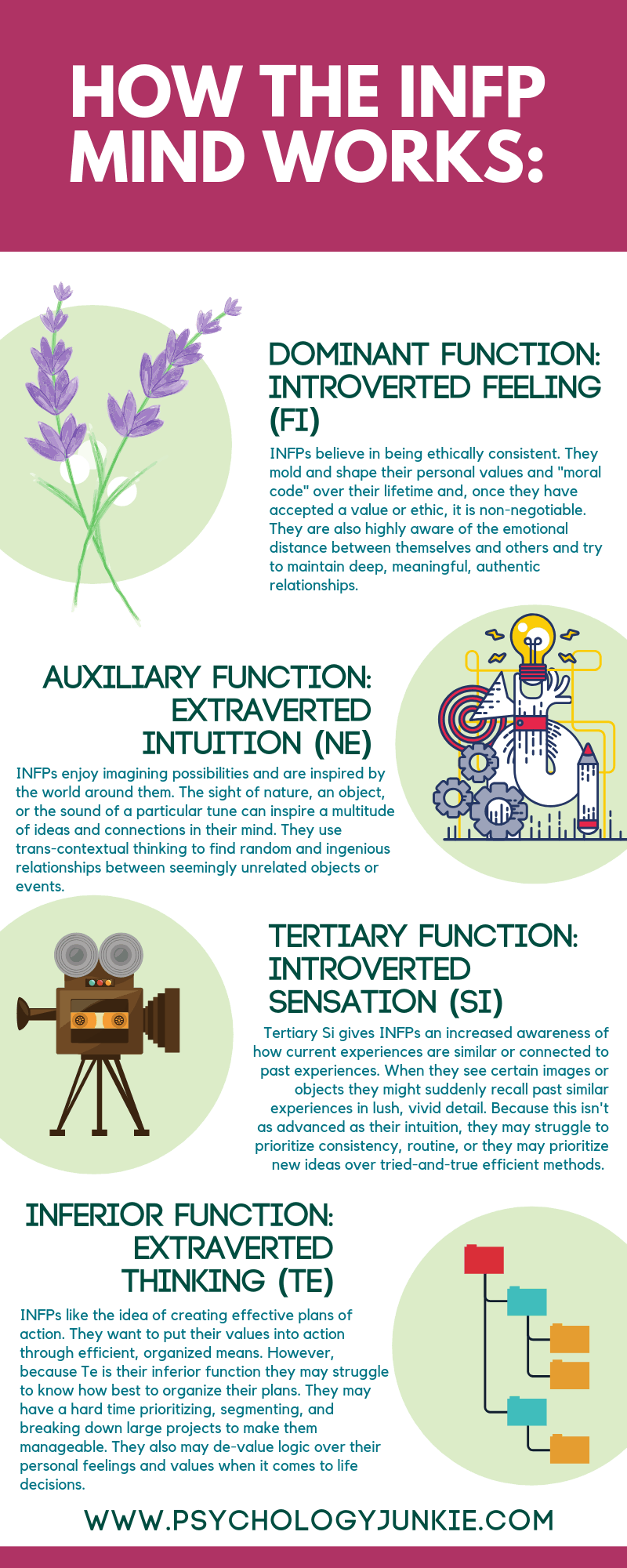A Look Inside the INFP Mind
Updated March 30th, 2025.
Today we’re going to explore the unique processes at work in the INFP mind. As an INFP you have a creative and ingenious way of understanding the world. You’re someone who values personal integrity to a great degree. This means that you check in with yourself to make sure you’re not being hypocritical and that your values are consistent. You’re also someone who prizes imagination, creativity and thinking outside-the-bounds of what exists right now.

This infographic gives you a glimpse into your mind and how you process information:
Not sure what your personality type is? Take our new personality questionnaire!
The INFP Mind in More Detail
Dominant Mental Process: Introverted Feeling (Fi)
From the infographic: “INFPs believe in being ethically consistent. They mold and shape their personal values and “moral code” over their lifetime and, once they have accepted a value or ethic, it is non-negotiable. They are also highly aware of the emotional distance between themselves and others and try to maintain deep, meaningful, authentic relationships.”
As an INFP, your values don’t come from a rulebook or society’s expectations—they come from somewhere deeper, a place that feels almost instinctual. You know when something feels right or wrong, even if putting those feelings into words is hard. It’s like you’re constantly weighing the light and dark of every situation, asking yourself, “Does this align with what truly matters to me?” And it’s not just a passing thought—it’s something you wrestle with until you’re sure. Living in alignment with these carefully examined values isn’t optional for you—it’s essential for your sense of peace and authenticity. That’s probably why you’re naturally drawn to people who break the mold—misfits, rebels, and cause-driven individuals who stay true to themselves, no matter what.
Because you spend so much time exploring your identity and values, you can’t stand being reduced to a quick label. When someone tries to sum you up in a sentence or stereotype, it feels like they’re ignoring the rich, complex world inside you. They don’t see the endless questions, the deeply felt convictions, or the quiet strength it takes to stay true to yourself in a world that often pressures you to conform. Being misunderstood in that way doesn’t just annoy you—it hurts.
Another thing about you? You’re incredibly attuned to the emotional space between yourself and others. You’re constantly picking up on subtle cues—how someone’s tone shifts, the micro-expressions they don’t even realize they’re showing. You instinctively ask yourself, “Do they feel safe with me? Are they being genuine? Can I trust them, or are they hiding something?” This awareness means you’re quick to spot authenticity—or the lack of it. You crave sincere, deep connections where emotional bonds aren’t just surface-level but rooted in trust and mutual understanding.
Because of this finely-tuned emotional radar, you often show up in the world as:
✨ Gentle and compassionate – offering a safe space where others can be their true selves.
✨ Introspective and thoughtful – always reflecting on what really matters.
✨ Sincere and authentic – showing up as your real self, even when it’s hard.
✨ Attuned to others’ distress – noticing feelings before they’re even spoken.
✨ Emotionally supportive – giving people space to process without judgment.
✨ Accepting of outsiders and misfits – recognizing the beauty in those who don’t fit the mold.
✨ Aware of individual needs and values – meeting people where they are and respecting their truth.
You don’t just see the world as it is—you see what it could be. And that’s a rare and powerful gift.
On a scientific level, INFPs show high levels of activity in region F8 of the brain. This area controls emotional regulation, drawing with the right hand, and ranking things in order of importance. This area lights up when someone talks about what’s important to them (“My values,” “My favorite movies,” “My favorite family members.”) INFPs enjoy examining how people, objects, and events feel to them. They enjoy exploring their unique tastes and preferences and discussing these with other people they trust. You can find out more about the INFP brain in Dario Nardi’s book, Neuroscience of Personality: Brain Savvy Insights for All Types of People (this link is an affiliate link).
Auxiliary Mental Process: Extraverted Intuition (Ne)
From the infographic: “INFPs enjoy imagining possibilities and are inspired by the world around them. The sight of nature, an object, or the sound of a particular tune can inspire a multitude of ideas and connections in their mind. They use trans-contextual thinking to find random and ingenious relationships between seemingly unrelated objects or events.”
When you take in information from the world around you, your mind doesn’t just stop at what’s in front of you—it immediately starts spinning out possibilities. You don’t just see an apple. You think about everything that apple could be. Could you carve a tiny sculpture out of it? Write a poem about “the apple of your eye”? Explore what apples have symbolized throughout history? Your mind doesn’t linger on the surface—you’re off chasing ideas, tangents, and “what ifs” before most people have even taken a bite.
This is where you’re wildly different from someone with strong Extraverted Sensing (Se). While Se sees an apple and thinks, “Should I eat this right now? It looks crisp and delicious,” your brain isn’t focused on this apple—it’s captivated by the endless possibilities that the apple inspires. For you, it’s not about what’s in front of you—it’s about what could be. That’s where your imagination lives, and it’s a playground of limitless ideas and connections.
Because your mind thrives on exploring possibilities, this mental process tends to make you:
🍎 Imaginative and whimsical – always dreaming up new ideas and possibilities.
🍎 Creative and expressive – turning ordinary things into works of art or inspiration.
🍎 Visionary and future-focused – seeing what could be long before others catch on.
🍎 Innovative and curious – constantly asking, “What if…?” and exploring uncharted paths.
🍎 Open-minded and adventurous – willing to explore concepts that others overlook.
🍎 Explorational and playful – finding joy in ideas that stretch the limits of reality.
For you, life isn’t just about what’s visible—it’s about uncovering hidden meanings, reimagining possibilities, and creating something extraordinary out of the ordinary.
Tertiary Mental Process: Introverted Sensation (Si)
From the Infographic: “Tertiary Si gives INFPs an increased awareness of how current experiences are similar or connected to past experiences. When they see certain images or objects they might suddenly recall past similar experiences in lush, vivid detail. Because this isn’t as advanced as their intuition, they may struggle to prioritize consistency and routine, or they may prioritize new ideas over tried-and-true efficient methods.”
Introverted sensing often feels refreshing and enjoyable for you to experience. In fact, some typologists call the tertiary function the “relief” function because it tends to feel relaxing and playful. Si is focused on reliving past impressions and experiences that are triggered by the current experience. For example, you might look at a rainbow and vividly recall a camping trip where you looked at a rainbow from your grandfather’s lap. You would remember the wrinkles in his hands, the humidity in the air, the joy you felt…you wouldn’t remember all the concrete details about the rainbow itself, per se, but you would remember a precise impression of that moment. This function gives you a particular fondness for certain comforting rituals, hobbies, or types of entertainment. You might find yourself watching certain movies from your childhood when you are stressed, or you might have frequent moments of intense nostalgia.
Since Si is your tertiary function, you tend to not give it the same value as intuition. While you might enjoy tapping into it during stress-free, relaxed times, you tend to prioritize Ne most of the time. When being given a project you’ll probably feel like innovating, switching things up, and generating possibilities. You’re not likely to complete the project the same way you did in the past. You’re more fond of change than sameness when it comes to most things. Unlike Si-dominant types who find comfort in routine and a consistent lifestyle, you tend to get bored when life gets too routine.
Having Si in the tertiary position can make you:
- Comforted by familiarity
- Nostalgic
- Rejuvenated by consistent rituals
- Prone to replaying past negative experiences too frequently
- Stubborn about doing things in a particular way
- Unwilling to listen to new ideas (if Ne isn’t properly mature)
Inferior Mental Process: Extraverted Thinking (Te)
From the infographic: “INFPs like the idea of creating effective plans of action. They want to put their values into action through efficient, organized means. However, because Te is their inferior function they may struggle to know how best to organize their plans. They may have a hard time prioritizing, segmenting, and breaking down large projects to make them manageable. They also may de-value logic over their personal feelings and values when it comes to life decisions.”
You have a deep desire to bring your ideals to life in an organized, efficient way. In a perfect world, you’d take all those brilliant ideas swirling around in your head and make the perfect system to make them happen. You’d create a plan, stick to a schedule, and check off each task. But… it’s not a perfect world. And for you? Sticking to a rigid structure or breaking big ideas into small, manageable steps can feel like trying to tame a wild animal. It’s exhausting, overwhelming, and can make you really stressed out.
You want to be systematic and goal-oriented, but your mind naturally leans toward inspiration and exploration, not spreadsheets and to-do lists. When deadlines loom or big projects pile up, it’s easy to feel paralyzed by the volume of what needs to be done. But here’s the good news: As you get older, your ability to tap into this part of yourself—your Extraverted Thinking (Te)—gets stronger. You become better at organizing your thoughts, creating actionable plans, and actually following through on those big dreams.
That said, under stress? Te can take over like an overzealous drill sergeant. When this happens, you become hyper-focused on logic and efficiency at the expense of empathy and connection. You might find yourself rigidly organizing every detail, criticizing yourself (and others) for not meeting impossible standards, and losing sight of the emotional nuances that usually guide you. It’s like going from gentle philosopher to ruthless taskmaster overnight—and it’s not a pleasant shift for anyone involved.
Because Te sits in your tertiary position, it tends to make you:
📝 Occasionally brilliant at organizing and structuring projects – when inspiration and focus align.
📝 Struggle to break down big ideas into small, actionable steps – leading to overwhelm and procrastination.
📝 Rely on measurable facts when under pressure – sometimes ignoring intuition or emotional cues.
📝 Critical and dogmatic in high-stress situations – focusing too much on logic and losing sight of empathy.
📝 Easily overwhelmed by deadlines and big tasks – feeling like you’re drowning before you even start.
📝 Nervous when tasked with managing large projects – fearing that you’ll miss an important detail.
When balanced, your Te can be a powerful ally—helping you turn dreams into reality. But when unchecked? It can leave you feeling like you’re chasing perfection at the cost of your own peace.
Some Tips for the INFP Struggling with Te:
What Are Your Thoughts?
Do you have any insights or examples of how these processes have shown up in your life? Share your thoughts with other readers in the comments!
Find out more about your personality type in our eBooks, Discovering You: Unlocking the Power of Personality Type, The INFJ – Understanding the Mystic, and The INFP – Understanding the Dreamer. You can also connect with me via Facebook, Instagram, or Twitter!
Learn More About Your Personality Type:
What It Means to be an INFP Personality Type
7 Ways That INFPs Make an Impact
The Powerful Imagination of INFPs and INFJs
10 Things That Excite the INFP Personality Type












Yes. If I have a large project or like more than 5 or 6 things on my to-do list, I feel overwhelmed and can’t see my way through to the solution. The only way I can get through this is to write a to-do list and tick things off as I go, which helps me have a feeling of accomplishment (and celebrating those little victories) even if it might not take too long to get through my to-do list…. if I don’t do my to-do list, I lose willpower very quickly and often don’t start things because of that overwhelming feeling…
I think this is an excellent break-down of my personality type.
Dear Susan, Another one out of the park. Thanks for distilling my mind to these simple steps. I will check out Trello and Notion. I can forgive myself for all the times I thought I was being “stupid” and /or uncoordinated. I just needed to know these wonderful “tools” to use. And that’s 64 years of harassing myself, not counting the years since I first found your blog in 2022.
Best Regards,
Stephen